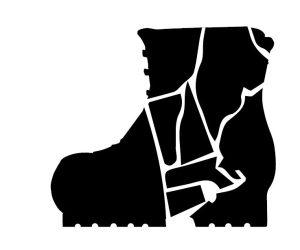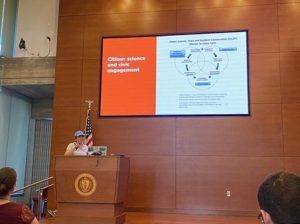Oct
11

Posted by Margot M on October 11th, 2024
Posted in: Funded Project
Tags: Boot Camp, Citizen Science, science librarians
Part of a blog post series from New England Science Boot Camp for Librarians scholarship recipients. These entries were edited for brevity so that we could include all entries on this topic.

Logo for New England Science Boot Camp for Librarians
Emily Irvine (University of Maryland, College Park):
Caroline Nickerson’s presentation on SciStarter and citizens’ science was dynamic. Prior to this presentation, I had not given much thought to citizens’ science, but I was made a believer that citizen science should have a home in libraries. Nickerson shared different ways to incorporate citizens’ science into what libraries offer and how different kinds of libraries can facilitate citizens’ science in all kinds of ways, in a manner that makes sense for their institution. Hosting citizen science programs is a great way to invite more diverse groups of people into library spaces and contribute to the work citizen scientists are doing.
Daniel Folk (Wayne State University):
As someone who has worked in a museum and public library, I believe every person should be able to contribute to science, even in the smallest ways. [Citizen Science] is more open than any student research project, and could lead to some more practical applications, like science kits to be used during any time by any student. Honestly, I am eager to use this in places other than academic libraries, and let the younger population get involved. Not everyone can have access to labs, but anyone can take pictures of their environment and share it with a scientist.
Christina Advento (Trinity Hall):
Caroline Nickerson noted the importance of colleges and universities in promoting the democratic values that Citizen Science espouses, such as access and universal participation. Steven Witzig and Kathryn D. Kavanaugh described a compelling problem for science—the large amount of STEM students who leave the field during their college years, often due to poor pedagogy by faculty. As a teacher-librarian in an all-girls STEM-focused high school, I believe my science faculty would be interested in how Citizen Science can engage their students. I look forward to encouraging participatory science, especially to increasing female interest in continuing their STEM education into college and beyond.

Photo by Samantha Porter
Samantha Porter (Woods Hole Oceanographic Institute):
Woods Hole seems like the perfect place for Citizen Science projects. There is a high concentration of professional scientists here, and the community is engaged and supportive of the scientific work being done in the area. The group conversations we had during this session were helpful in thinking about how a Citizen Science project might be implemented in my library. Having the opportunity to talk to Stephen Witzing and Kathryn Kavanagh provided perspective on faculty-library collaborations. There is so much potential for my library to engage our scientists outside of their labs in Citizen Science projects that they would find interesting and fun!
Melanie Salvat (Boston University):
Citizen science is important because scientists alone don’t have enough eyes and ears to answer every question themselves! Phenological changes (often referred to as “nature’s calendar”), which are key indicators of climate change, have been tracked over two centuries thanks to citizen scientists. Libraries are perfectly positioned to support this initiative. Libraries can help track participation and circulate necessary materials, like kits for pollination studies or light pollution monitoring. By integrating citizen science into the academic library environment, we not only enhance educational experiences but also contribute to broader scientific understanding and community engagement. After all, not all STEM majors will become scientists – some, like me, will become librarians – but all will become citizens. So, “let’s create citizen scientists!”